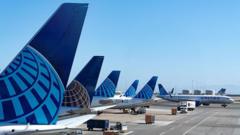In a significant development for Boeing, over 3,200 workers in its defense sector have launched a strike, marking the first such action within this division since 1996. The strike began on Monday as employees from Missouri and Illinois voiced their dissatisfaction with management's recent compensation proposal, which union members deemed inadequate. Key issues include pay, work hours, and pension plans.
Dan Gillian, the vice president of Boeing's Air Dominance unit, expressed disappointment over the rejection of what he called an offer featuring 40% average wage increases. The International Association of Machinists and Aerospace Workers (IAM), leading the strike, claims the situation underscores a need for "respect and dignity" in their workplace.
This strike adds to Boeing's woes, as the company has been grappling with a series of significant challenges, including earlier crises related to safety concerns and a prolonged walkout by passenger plane workers. Although CEO Kelly Ortberg attempted to downplay the strike's potential ramifications, noting it would be less disruptive than the previous walkout involving 30,000 workers, the strike nonetheless poses significant implications for Boeing's defense manufacturing operations.
Boeing has faced multiple setbacks in recent years, including two tragic crashes linked to its 737 MAX model and operational deficiencies that stalled aircraft deliveries. The company’s output fell to the lowest level since the onset of the pandemic, delivering only 348 aircraft last year.
As the situation develops, the focus remains on the potential impacts of the strike on Boeing’s recovery efforts and future operations within an already strained aviation sector.


















